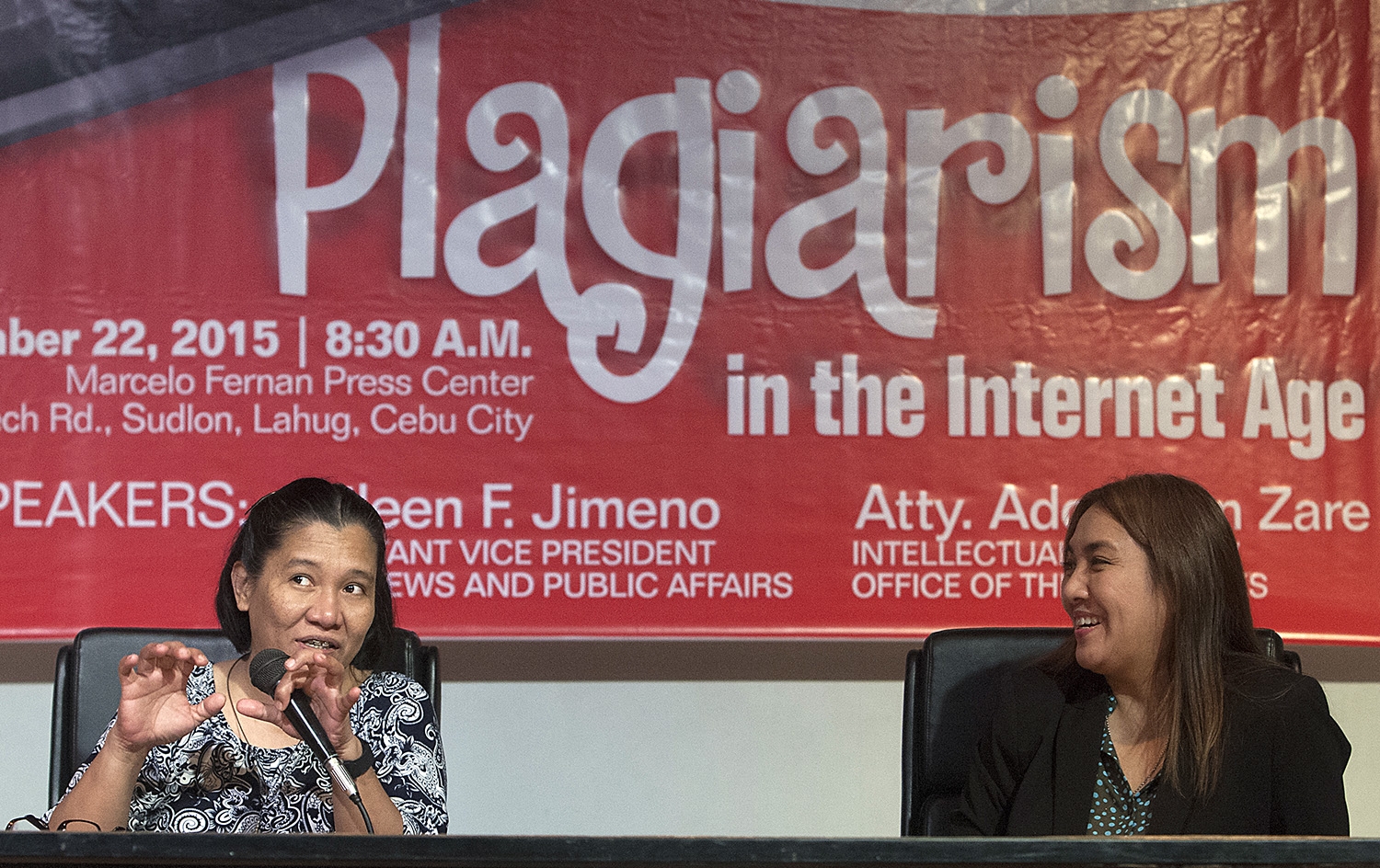‘Don’t steal someone’s work; give due credit’

PRESS FREEDOM: Jaileen Jimeno, GMA AVP news and public affairs (left) and lawyer Adoracion Zare, Intellectual Property office of the Philippines talks on plagiarism in the Internet Age as part of the Cebu Press Freedom Week celebration 2015 at Marcelo Fernan Press Center. (CDN PHOTO/TONEE DESPOJO)
Constant advances of technology open up new avenues and temptations for plagiarism or copying someone else’s work.
A veteran journalist yesterday urged media workers and communication students to shun plagiarism and work harder to write original material.
Jaileen Jimeno, asst. vice president of GMA 7 News and Public Affairs, also encouraged teachers to instill a culture of honesty and professionalism among their students.
The ease of finding data and “cut and paste” techniques of copying from the Internet facilitates plagiarism but the values of respecting the work of others should be empahsized in school, she said.
In citing the ideas and works of others, one must give proper attribution to the original source, she said.
“The process is definitely tedious. But remember, if you are branded a plagiarist, it would be difficult to redeem your reputation,” said Jimeno at a forum at the jampacked Marcelo B. Fernan Press Center yesterday.
Verbatim
The forum organized by The Freeman was part of the activities of the Cebu Press Freedom Week celebration.
Lawyer Adoracion Zare of the Intellectual Property Office of the Philippines discussed the importance of copyright or the legal protection extended to the owner of an original work.
Jimeno explained the risks and penalties of copying someone else’s work, including musical compositions, without attributing the source.
Jimeno, a former contributor of The Freeman and former deputy executive director of the Philippine Center for Investigative Journalism (PCIJ), cited an example where the published work of one of their writers was copied verbatim by a newspaper reporter.
Upon investigation, it was discovered that the reporter had been lifting several quotes and reports from other media entities.
The reporter was suspended and the newspaper she worked with issued an apology to PCIJ.
“In kindergarten, we were taught the basics. Do not take anything which is not yours, and to say sorry whenever you commit something wrong,” Jimeno said.
To avoid plagiarism, she advised everyone to make proper attributions and to “give credit where it is due.”
Taken from the Latin word plagiarius which means “kidnapper,” Jimeno said plagiarism is defined as the practice of taking someone else’s work or ideas and passing them off as one’s own.
“If you copy or quote someone else’s work, attribute. It was not your work. (Hence), acknowledge the source,” she said.
Copyright
The problem, Jimeno noted, is that some students don’t even recognize that what they are practicsing is wrong.
Zare explained that original work of a creator is protected by a copyright.
“Copyright subsists in anything that you write as original. That includes books, lectures, musical compositions, drawings, paintings, photographs, and artistic works,” she said.
The remedy for such violation is to sue in court where penalties can be a fine or imprisonment.
There is no law declaring plagiarism as a criminal offense, she pointed out, but schools are free to set their own academic standards and often domake plagiarism a grounds for strong disciplinary sanctions.
Professor Mayette Tabada of the University of the Philippines Cebu, said modern technology makes plagiarism easier to do.
“But it is an insult to copy someone else’s work and take it as your own. As teachers, we must cultivate values in our students. We must remind them that when they leave the university, they carry it on their own,” said Tabada, one of the three reactors during the forum.
Professor Nestor Ramirez, chairman of the department of communications and journalism at the University of San Jose-Recoletos, said one must avoid mediocrity in work.
“Ask permission or cite the source properly. Even toddlers are trained to be honest,” he said.
Professor Mia Embalzado-Mateo, program head of communication of St. Theresa’s College, said she often requires students to handwrite compositions to discourage copying articles from the Internet.
“I encourage them to paraphrase, summarize, and to cite sources. We want honest write-ups. We want to focus on values. In school, we want students to be honest in their work,” she said.
Disclaimer: The comments uploaded on this site do not necessarily represent or reflect the views of management and owner of Cebudailynews. We reserve the right to exclude comments that we deem to be inconsistent with our editorial standards.




